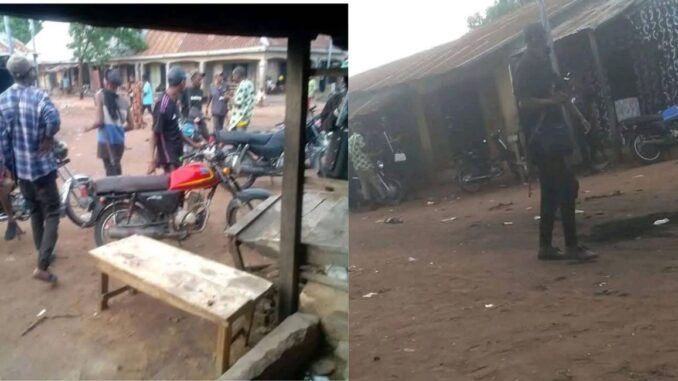News
Bill to ban foreign currency for transactions scales first reading

A bill seeking to ban the use of foreign currencies for payments and transactions in Nigeria has passed its first reading in the Senate.
The proposed legislation aims to restore confidence in the Naira, eliminate discriminatory payment practices, and bolster the country’s monetary sovereignty.
The bill, titled “A Bill for an Act to Alter the Central Bank of Nigeria Act, 2007, No. 7, to Prohibit the Use of Foreign Currencies for Remuneration and for Other Related Matters,” is sponsored by Senator Ned Munir Nwoko, Chairman of the Senate Committee on Reparations and Repatriation.
Senator Nwoko criticized the widespread use of foreign currencies in Nigeria, describing it as a colonial relic that undermines the value of the Naira and perpetuates economic challenges.
“The use of the Dollar, Pound Sterling, and other foreign currencies for domestic transactions is a colonial relic that continues to hinder Nigeria’s economic independence,” he said.
The bill proposes that all salaries, including those of expatriates, be paid in Naira. It also seeks to make the Naira mandatory for export transactions, requiring international buyers to purchase the currency, which would drive up its demand and value.
Additionally, the legislation aims to address unethical practices in the informal currency market, strengthen industrial growth through affordable loans, and safeguard Nigeria’s economic sovereignty by storing foreign reserves domestically.
Clarifying concerns over domiciliary accounts, Senator Nwoko explained that transitioning their balances to Naira would be voluntary. “As the Naira strengthens, the need to hold foreign currencies would diminish, making the transition seamless,” he said.
He also assured Nigerians that access to foreign exchange for legitimate purposes, such as travel and medical needs, would be streamlined through banking reforms, alleviating concerns over access to Basic Travel Allowance (BTA) and other forex requirements.
Citing Morocco as an example, Nwoko noted the stability of the Moroccan Dirham, which has maintained consistent value against major currencies for over 35 years.
“With Nigeria’s vast resources and vibrant population, we have the potential to surpass Morocco’s achievements, but only if we embrace a paradigm shift in how we use and perceive the Naira,” he added.
The bill also envisions a future where Nigerian banks expand globally, offering innovative financial tools to simplify international transactions.
It seeks to address existing challenges, such as the inability of Nigerian debit cards to facilitate online payments, while reducing reliance on domiciliary accounts.
If enacted, the bill could mark the beginning of a transformative era for Nigeria, fostering economic growth, cultural pride, and sustainable development anchored in the strength of the Naira.
News
Reps Tackle CBN, OAGF Over Missing Grants, Bailout Funds

According to him, such financial mishandling not only disrupts critical public services and projects but also results in major losses to the nation’s purse—resources that could have been channelled into crucial services and developmental efforts, as laid out in Section 14(2)(b) of the Constitution.
Speaker Abbas, thereafter setup a Special Committee to be chaired by Rep. Chinedu Martins to immediately launch a probe into the “Utilisation of take-off grants, bailout funds, and interventions allocated to MDAs, government institutions, and GOEs from 2015 to present.”
News
Abuja light rail project must be commissioned on May 29-Wike vows

The FCT Minister, Mr. Nyesom Wike, expressed satisfaction with the progress on the Abuja light rail project, reaffirming its May 29 delivery as sacrosanct.
He made these assurances after inspecting the ongoing construction of access roads to the train stations on Wednesday, from Metro Train Station in the Central Area to Nnamdi Azikiwe International Airport, Abuja.
Reassuring journalists accompanying him, the minister reiterated that President Bola Tinubu would commission the rail project on May 29 to mark his second year in office.
The visited stations were Wupa station near Idu and Bassanjiwa station near the airport.
“This is part of our routine inspection of ongoing projects to see the contractors’ progress,” Wike explained.
“We are working day and night to fulfill our promise to President Tinubu and FCT residents. By May, Mr. President will ride on the Metro line.”
News
Just in: Alleged Herdsmen Armed With AK-47 Rifles Take Over Communities In Benue State

Gunmen suspected to be Fulani herdsmen are currently invading some communities in the Ukum Local Government Area of Benue State.
According to sources, the herdsmen armed with AK-47 rifles stormed the community around 04:15pm on Thursday.
“Our lives are in danger this evening, armed Fulani herdsmen, about 600 in numbers have taken over our communities this evening,” a resident told SaharaReporters.
“They’re currently moving around towns in Ukum Local Government Area of Benue state. No security personnel at all, Governor Alia didn’t send security, they said operation will start soon once they (herders) have observed the place.”
The insecurity situation in Benue has been alarming in recent weeks with attacks from gunmen suspected to be herdsmen.
The media had reported that suspected herdsmen again unleashed terror in Benue State, attacking three communities in Otukpo Local Government Area (LGA) on Wednesday, just a day after 11 people were killed in a deadly raid on Otobi community.
The latest victims of the escalating violence were Emichi, Odudaje, and Okpamaju, communities that had previously suffered an attack in February, which left five people dead.
However, the renewed attack has created fear and mass displacement among residents, with women and children fleeing to safety.
Local sources say the death toll from the fresh attack remains unclear, but several casualties are feared.
-

 News10 hours ago
News10 hours agoBREAKING: Unknown gunmen reportedly storm Senator Natasha’s family residence
-

 News13 hours ago
News13 hours agoSnub story on removal of Rivers Sole Administrator, it’s FAKE-Chief Registrar
-

 News19 hours ago
News19 hours ago“How my father escaped assassination” – Bishop Oyedepo’s daughter
-

 News19 hours ago
News19 hours agoFG expresses sympathy for CBEX victims, urges a united effort to combat Ponzi schemes
-

 News12 hours ago
News12 hours agoSAD! Again, Alleged Herdsmen Attack Three Benue Communities
-

 Politics12 hours ago
Politics12 hours agoPDP govs are jokers, can’t stop coalition train, Atiku boasts
-

 News5 hours ago
News5 hours agoAbuja light rail project must be commissioned on May 29-Wike vows
-

 News10 hours ago
News10 hours agoLawmaker Slams NBA Over Rivers Crisis, Demands Return of N300m

















